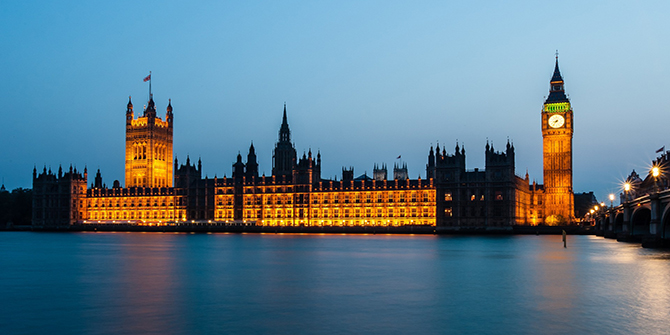 The fight for Europe cannot just be a fight against how certain things are done, but also a fight for how they should be done, writes Lea Ypi. This requires changing power relations and power structures, both within states and between them.
The fight for Europe cannot just be a fight against how certain things are done, but also a fight for how they should be done, writes Lea Ypi. This requires changing power relations and power structures, both within states and between them.
The one conclusion on which many seemed to agree after the European elections was that: ‘it’s complicated‘. The far right did what it promised, it increased its vote share, but not to the extent one feared. The left lost ground, except for a few places.
That the scale of the defeat was not quite as spectacular as expected is no reason to be optimistic. It may be more revealing of how much we have normalised the discourse of the right – for example, being told that migrants in need should be left to drown. The centre left is mostly in retreat, and the advances of solidly pro-European parties like the Greens in Germany or like the anti-austerity socialists of Portugal and Spain may be too ephemeral to give us reason to cheer. In the United Kingdom, Labour is at a cross-road: urged to embrace the cause of ‘remain and reform’ or condemn itself to irrelevance for many years to come.
This is a crucial time for the development of an alternative vision of Europe. The old coalitions in the European parliament are broken, and unless the progressive left comes up with a genuinely transformative agenda, that vision will be shaped by the far right. What Europe will be in the future depends on what we say and do about it now. Yet ‘remain and reform’ may be too vague to persuade those who voted for Brexit for a reason in 2016, and arguably voted for the Brexit Party for the same reason in 2019. These reasons are not reducible to a new cosmopolitan versus communitarian cleavage: there is probably more solidarity amongst cleaners of different nationalities than there is amongst bankers. Nor is it about class versus culture. The composition of the working class has changed in recent years but to say that the working classes are now all in places like Wigan just shows you never took the bus to Harlesden. It is also to maintain, implicitly, that the poor can only be ignorant and racist, or that cosmopolitanism makes you outward looking and altruistic. Both claims are plainly false.
Remain versus Leave is not a political cleavage that the progressive left can do anything with: this may explain the dilemma of the Labour Party. But what Brexit offers, and what unites that offer to the project of the nativist right all across Europe is the promise of political agency, the promise of being empowered after decades of political and economic disenfranchisement. One can only be empowered if one knows where power lies. In a world of nation-states, power is coupled with the idea of popular sovereignty. Taking back control means a return to popular sovereignty, to the site where power struggles can be fought and, with sufficiently strong political movements, won. What makes Brexit and the nativist idea of Europe attractive from a left-wing perspective is the promise of restoring sovereignty to the nation-state, thereby also turning it to a site in which even vulnerable people can exercise democratic control, for example by voting against what the establishment is perceived to want.
There are shortcomings to these propositions. One is that we still have not been told what to do about capitalism. But the trouble with the pro-European, critical left is that it abounds in diagnosis and lacks in prescription. A credible progressive movement for remain and reform needs to articulate what ‘reform’ would look like, starting with the obstacles to it in the current structure of the EU. It would also need to indicate a feasible path for how to get from here to there.
This is where it gets properly tricky. ‘Remain and reform’ or the manifesto for Social Europe have been the rallying call of European social democrats for a few years now. There are structural reasons why they have failed, not all reducible to the centre left embrace of capitalism with a human face.
In the nation-state, popular sovereignty may be an ideal but at least we know where power lies. The combination of its executive, judicial, and administrative structures gives us a target and a structure for the fight. In the case of the European Union we have no clue what popular sovereignty consists of, not even in its ideal form.
Plato says in the Republic that democracy is like a constitutional bazaar. People in it have so much freedom that they can choose any other form of rule as the foundation of the state: rule by the people (democracy), rule by the rich (oligarchy), rule by the best (aristocracy) and, when democracy deteriorates, rule by tyrants.
The European Union may not be democratic in the sense in which it aspires to be, indeed the topic of its ‘democratic deficit’ has concerned eurocrats in theory before it began to concern the wider public in practice. Yet the EU comes close to Plato’s definition of a democracy when one looks at its institutional configuration. If you focus on the European Parliament, you have something akin to rule by the people. If you focus on the powers of the European Central Bank you have something resembling rule by the rich. If you focus on the powers of the Commission and of the European Court of Justice you get rule by the best (or in this case, the experts). And if you focus on the powers of the Council you have a cocktail of all of these.
This combination of elements makes the progressive agenda for reforming the EU a particularly challenging one. In the case of the nation-state, the fact that there is sovereignty (at least nominally) makes it possible to locate the site of political power and challenge any particular balance of power relations through the usual democratic channels of political will-formation (elections, the authorisation of representatives, referenda, protests, boycotts, strikes). In the case of the EU, by the very nature of its institutions, none of this is sufficiently entrenched. The only credible way forward is to elaborate progressive policies: a green new deal for Europe, a common European migration policy, a progressive taxation scheme, and so on. But policies without politics, is still politics focused on outcomes at the expense of processes. Agency is still marginalised in favour of structure. Democracy in theory is still likely to lead to tyranny in practice.
This is why it is not enough for the left to have policy ideas if it lacks a movement that fights for those ideas, a collective agent that can own these ideas and a mechanism of democratic will-formation that can be expressive of that agency. It is also why particular proposals for reform will not be enough unless there is an overall European movement that shapes the day-to-day struggles of those who are failed by capitalism (in both its cosmopolitan and nationalistic versions) and that articulates the conflicts they experience within a transformative, left-wing, vision of Europe.
The fight for Europe cannot just be a fight against how certain things are done, but also a fight for how they should be done, not just for policies taming capitalism but for a politics conducive to socialism. Yet fighting for socialism in Europe requires changing both power relations and power structures, both at the level of nation-states and between them. Europe is up for grabs. But given the shape of its institutions, what begins as a mission to ‘remain and reform’ may well end up as ‘remain and revolution’. This is a heroic task. No wonder the left is not ready for it.
_________________
Note: a version of the above also appeared in the New Statesman.
 Lea Ypi (@lea_ypi) is Professor of Political Theory at the London School of Economics and Political Science and co-author of The Meaning of Partisanship.
Lea Ypi (@lea_ypi) is Professor of Political Theory at the London School of Economics and Political Science and co-author of The Meaning of Partisanship.
All articles posted on this blog give the views of the author(s), and not the position of LSE British Politics and Policy, nor of the London School of Economics and Political Science. Featured image: Pixabay.







